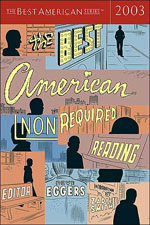[Transcribed discussion of “The Good Word,” by Yannick Murphy, published in One Story.
While on vacation, the narrator of this story and her friend Iris, both American, meet a German named Jurgen. Jurgen goes on and on about an untranslatable German word meaning “a good feeling people have when they are together.” The next day, Jurgen and the two women travel to a beachside boarding house. There they encounter an old man who covets Iris and, seemingly inexplicably, despises Jurgen. The four keep uneasy company—they go swimming, they eat together, and they talk about the untranslatable German word. The narrator asks Jurgen if the “good feeling” was present in Germany when Hitler reigned. Jurgen admits it probably was. Sometime later, the old man’s son—called the Connector—shows up. He, too, wants Iris. In the end, the Connector and the old man get into a brawl and Jurgen and the two women leave them behind.]
Eli: I liked it. It was really succinct writing. It was very unique. It’s almost like a series of frames, taken one by one and then pieced together. The sentences are so matter-of-fact and simple.
Roxie: Yeah, I thought the writing style worked well. It was really good at building suspense. It didn’t tell too much. On page nine, when it says the old man “had Iris up against the wall and was pushing on her hard” and “her eyes were closed because of the pain,” I thought he was raping her. But it turns out that he was just helping her pop her dislocated shoulder into place. The style worked really well there and elsewhere to build suspense.
Vicky: I agree. The writing makes you jump to conclusions, but then when you read a little further, it doesn’t turn out the way you thought it was going to. I kept being surprised.
[The students were asked why the author’s simple sentence structure is so effective.]
Molly: It’s because she holds off until the very end. And then you really appreciate it when she changes the style a bit. Up until the end, though, she’s very objective. You’re supposed to interpret for yourself. But then she reveals how the narrator feels. When she does that she uses longer sentences that aren’t just descriptions of what’s happening. That’s when she touches on the meaning of the story.
[At the end of the piece, the narrator reveals her frustration with Iris. To the narrator, Iris is the embodiment of the German word. Everyone wants Iris, everyone wants to be around her, but at the same time, says the narrator, this creates tension and quarrelling—like between the old man and his son. In light of this, the students were asked what they thought the meaning of the story was.]
Molly: When you read this story, you think about the feeling of the word Jurgen keeps talking about. The story is about that feeling. It’s something that brings people together and also tears them apart. Iris is nice to everyone and she draws everyone to her, but she also drives people apart.
Roxie: Iris causes a problem because everyone wants to be with her but they can’t all have that. It doesn’t work out. I think the author mentions Nazi Germany to point out the fleetingness of the good feeling, and to show that there’s a difference between real love and this kind of fake good feeling that actually drives people apart or causes tension.
Eli: And the good feeling is a ubiquitous feeling. Throughout the story they all feel good together. But at the same time there are these tensions under the surface. They have this sexual tension. It escalates. It reaches a breaking point. The father and his son have their scuffle. The good feeling isn’t so good after all.
[The students were asked if the author is putting forth a dark view of humanity.]
Eli: No, just a realistic view. In Nazi Germany, for example, you like to think it was a different feeling they had. That it was different from anything we feel. You like to think they had some kind of pride in their malevolence. But that’s not true. They actually had a genuine feeling of pride in their nation. They could justify what they were doing. And in this story, all the characters could justify their actions, too. Their motivations made sense. You knew why they went here or there, or why the old man and the son got in a fight.
Will: I think the word is about reaching out to people and being happy together. Having good feelings with a bunch of people. Jurgen starts out telling them about it, but at the same time he wants to have sex with the women so I think he has corrupted motives. The same thing goes for everyone. Iris is reaching out to people. But Iris likes all the attention and so I think she has corrupted intentions as well.
[The students were asked if at any point in the story the characters are actually feeling the sense of fellowship or togetherness described by the German word.]
Roxie: No, I don’t think so. I think that’s the point. They can’t have this good feeling together. There is too much tension.
Will: I disagree. I think at the end, because they’re all thinking about the word and saying it and talking about it, they are really feeling it.
Subscribe to:
Post Comments (Atom)









No comments:
Post a Comment